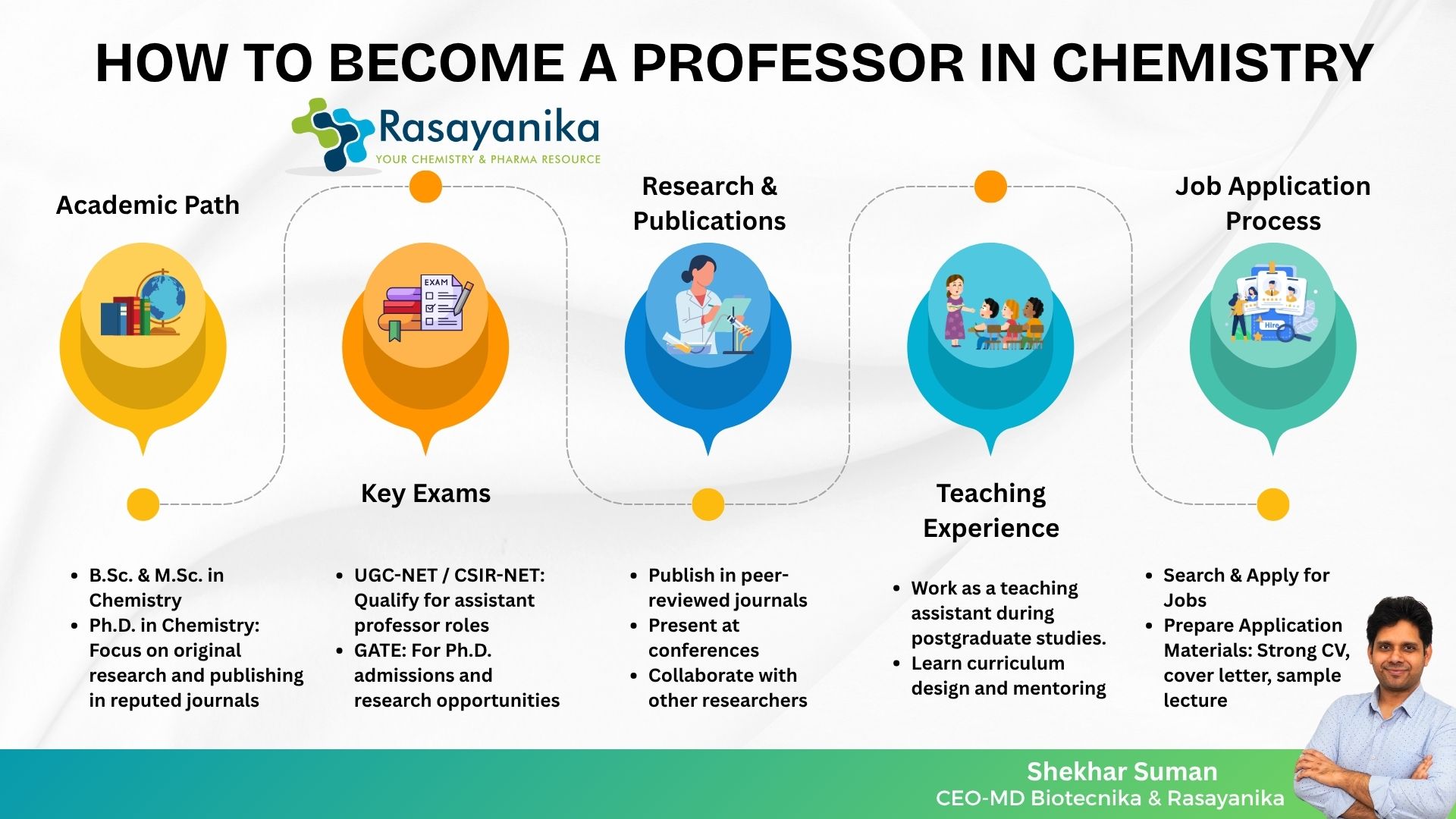style="text-align: center;">How to Become a Chemistry Professor in India?
As Dr. Riva Sharma walked into the chemistry lab, all set to nurture the young minds, she felt like she was in a dream. Transitioning from a small government college in Kerala to guiding Ph.D. students was something she never imagined. She was just another curious student who was watching chemical reactions transform colors in test tubes. The world of chemistry encouraged her to ask more profound questions, the kind that textbooks alone can’t answer.
She spent sleepless nights in research labs, countless journal submissions, and immersing herself in the world of chemistry. As a reward for her hard work, she now holds the title of Professor of Chemistry at one of India’s most prestigious universities. This was a smooth transition. Many hurdles were challenging her at every step. There were competitive exams, academic pressure, and a lot of self-doubt. However, her passion for the subject and determination helped her overcome all the challenges.
If you are a chemistry student who wants to walk a similar path, you are at the right place. This article is for you. The journey of becoming a Chemistry Professor in India is beyond collecting degrees. It’s about having a deep understanding of the subject, making an impactful research contribution, and enhancing your skill set. As a professor, you will be responsible for shaping the next generation of science graduates.
Let us explore the journey of becoming a Chemistry Professor in India. We will see how we can turn your passion for the subject into a fulfilling and rewarding career in chemistry.
- Academic Qualifications
To begin your journey, a strong foundation in chemistry is a must. Your academic qualification will contain three main stages. These stages are:
- Bachelor’s Degree (B.Sc. Chemistry)
Their journey will begin with a bachelor’s degree in Chemistry. This 3-year course will give you a fundamental knowledge of physical, inorganic, and organic chemistry. You will have hands-on experience with the chemistry experiments. Additionally, you will learn about another related field of science. This will help you build interdisciplinary skills. During your early academic years, strengthen your concepts and maintain a good academic record. Remember, the country’s top universities offering a postgraduate program demand a minimum percentage (often above 55%-60%). A high CGPA will help you secure admission to prestigious universities.
- Master’s Degree (M. Sc Chemistry)
After completing your bachelor’s degree, the next step is a master’s degree in Chemistry. In this 2-year course, you will have a deep understanding of advanced topics like quantum chemistry, polymer science, spectroscopy, and analytical techniques. You will have first-hand experience in scientific research with your projects. Be wise while choosing your specialization in a master’s. Some of the common specializations are organic chemistry, physical chemistry, biochemistry, inorganic chemistry, and analytical chemistry. Your choice of specialization will shape your future research direction.
- Ph.D. in Chemistry
The most essential step in your journey is earning a doctorate in Chemistry. In India, this program lasts 3-6 years. You must qualify for national-level exams like GATE, CSIR-NET, or institute-level entrance examinations. After successfully qualifying for the exam, you need to approach the universities and institutes to secure admission. Strong academics, exam scores, recommendation letters, and research proposals will help you gain admission.
Under a supervisor, you will work on original research. During your Ph.D., you will conduct research, write scientific papers, and defend your thesis. After you complete your research, you will culminate it in a dissertation that adds value to the world of chemistry.
- Competitive Exams
You must be wondering why we are talking about competitive exams? Well, as you know, India has many national-level exams that play an important role in your journey. By qualifying for these exams, you will showcase your academic and research knowledge. After your master’s, you can become an assistant professor by qualifying for these exams, or you can take up a Ph.D. program and then become a Chemistry Professor in India. The top 3 exams to qualify as an assistant professor in India are:
- UGC-NET (University Grants Commission – National Eligibility Test)
In India, to become an assistant professor, you have to clear UGC-NET. Over the years, this has become mandatory. The National Testing Agency (NTA) conducts the exam, assessing the aspiring candidates based on their subject knowledge, general teaching, and research aptitude. With this certification, you are eligible to apply for assistant professor posts across the country. Remember, this exam is your gateway to academia.
- CSIR-NET (Council of Scientific and Industrial Research – NET)
Another specifically catering to science students is the CSIR-NET examination. With this exam, you can qualify for both Junior Research Fellowship (JRF) and Assistant Professor roles. This is ideal for candidates focusing on a research-intensive job or planning a Ph.D. This exam is one of the most challenging exams, focusing on the core subject. Clearing this exam increases your chances of being selected by reputed institutions.
- GATE (Graduate Aptitude Test in Engineering)
Primarily designed for engineering students, the GATE exam allows chemistry graduates to turn their dreams into reality. Many top-notch institutions accept the Chemistry CY paper for admission to their Ph.D. programs. These institutions are the Indian Institutes of Technology (IITs), the Indian Institute of Science (IISc), and the National Institutes of Technology (NITs). GATE does not directly offer you a teaching job, but it acts as a stepping stone by allowing you to gain admission to a Ph.D. program.
- Research and Publications
In the world of academia, the original research and scientific publications hold great value. As an aspiring Chemistry Professor in India, your research profile will help you get hired faster. Here are some important things you need to know for building your research profile:
- Publish in Peer-Reviewed Journals
Publishing your research work in indexed and peer-reviewed journals adds value to your profile. These publications highlight your credibility and your accomplishments to the international scientific community. Start publishing your work from your initial days of research. The publications in high-impact journals will help you stand out from the rest.
Aim for the quality journals with strong reputations in your specialization, which are more valuable than quantity journals. You can start publishing in the national journals first and then move towards international ones.
- Attend Conferences and Collaborate
Academic networking is vital. Presenting your work at national and international conferences and seminars will help you establish connections with like-minded individuals. You can collaborate with researchers across the globe, enhancing your professional profile. These events allow you to stay updated with the latest trends and technologies in Chemistry. You will gain research ideas and academic connections.
- Teaching and Experience
With your strong research profile, you must work on your teaching and mentoring skills. These skills are vital for your dream profession. To develop these skills, here are some insights:
- Gain Teaching Experience
During your postgraduate or doctoral studies, start working as a teaching assistant. Some universities allow Ph.D. students to teach postgraduate and undergraduate students. This opportunity will show the reality of the teaching profession. You will gain a deeper understanding of teaching, the grading system, and practical sessions. You will develop your teaching skills and become more confident in facing a large number of students.
- Take Pedagogy Courses
Another way to improve your teaching skills is to enroll in faculty development programs, MOOCs, or certification courses. These will enhance your teaching methodology, classroom management, and student engagement techniques. Remember, this job is not only about delivering lectures. It includes designing curriculum, mentoring students, and inculcating research interests in students. Hence, soft skills hold equal importance.
- Job Application
The final step towards your dream job is applying for it. After completing your education, research, and gaining experience, it’s time to step into the job market. You have to explore the market and prepare yourself and your application to be ideal for the job. Let’s understand this better.
- Explore Vacancies
Keep checking the websites of the universities and colleges regularly for recruitment updates. Visit IITs, NITs, IISERs, and other central/state colleges on a regular basis. You can find these vacancies in the University Grants Commission (UGC) portal, higher education departments, and national job boards, too. When applying for a job, read the eligibility criteria carefully. Some institutions require NET/SET certification, while others prioritize postdoctoral experience and publications.
Tip: You can subscribe to the Rasayanika Newsletter to have all the information at your fingertips on just one website.
Prepare Your Application
Craft a compelling cover letter and resume highlighting your qualifications, research, publications, and experience. A well-written statement of purpose can help you to stand out from the crowd. During your interview, you may be asked to deliver a sample lecture. Be prepared with topics you are confident in.
- Salary and Career Growth
Entry-Level Salary
A freshly appointed Assistant Chemistry Professor in India, in a central government institution, typically earns a salary under Pay Level 10 of the 7th Pay Commission, which ranges between ₹57,700 to ₹1,82,400 per month. Additional allowances like HRA, DA, and academic grade pay may apply.
Career Progression
Academic promotion depends on your research output, teaching quality, and years of service. The typical hierarchy is:
- Assistant Professor
- Associate Professor
- Professor
- Head of Department / Dean / Director
As you grow in your career, you will have better pay, more administrative roles, and higher academic influence. By consistently publishing, securing research grants, and mentoring students, you can scale new heights in your career.
Becoming a Chemistry Professor in India is a journey of academic commitment, intellectual curiosity, and consistent effort. From earning your degrees to passing competitive exams, each step is important in your journey.
In India, the need for quality chemistry educators is on the rise, especially in an era where science is driving technological and societal transformation. If you’re passionate about chemistry and aspire to inspire the next generation, this career path offers unmatched opportunities for growth, discovery, and contribution.
With determination, planning, and a strong work ethic, your dream of becoming a Chemistry Professor in India can become a reality.

















































